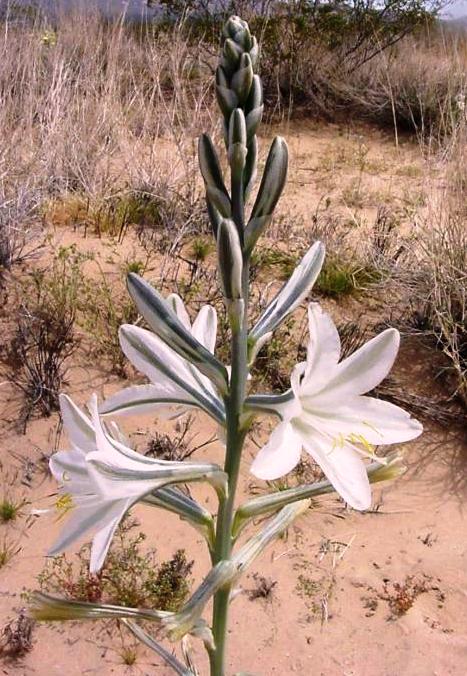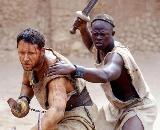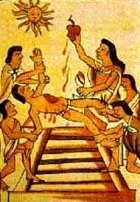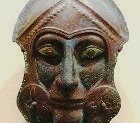Supported by other women

In the ancient world women mostly moved around in groups, not individually as they do today in modern western society.
They lived and died surrounded by female family members and friends.
- Jephtah’s daughter moved out to greet her father with other women, in a jubilant welcoming party
- she prepared for her death in the company of other women.
This perhaps accounts for the strength and initiative shown by biblical women. Middle Eastern women nowadays are forceful and strong-minded; Israelite women had similar temperaments.
Women’s festivals
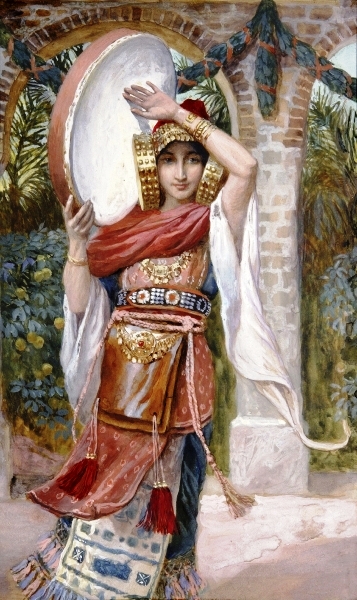
Jephtah’s Daughter, by James Tissot
Most of the customs surrounding women’s lives in ancient Israel have been lost to us.
Women did not record information in writing, as men did, so over the centuries it was lost and forgotten.
But the story of the festival that grew up to commemorate the death of Jephtah’s daughter has survived, and the reader can make some inferences from it:
- it involved young women, representatives of the companions who had accompanied her up onto the mountain in the weeks before she died
- these companions were presumably unmarried, as she was
- the festival may therefore have been linked to female pubescence and emerging adulthood.
- it commemorated a turning point, perhaps from childhood into the dangers of an adult woman’s life
- the event was seen as a death in some form or other – in the case of Jephtah’s daughter the death of her hopes for marriage and children
The Bible text constantly seeks to describe and interpret the condition of humanity: what is does and feels, why it does it, how it changes.
Jephtah’s human sacrifice
At the end of the Bible story about Jephtah’s daughter are the words ‘and he did with her according to his vow which he had made’.
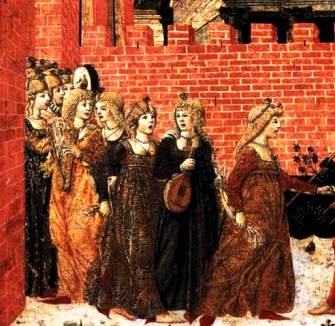
Young women processing out of the town to meet Jephtah, Giovanni Benvenuto
That vow had been that ‘whoever comes forth from the doors of my (Jephtah’s) house to meet me, when I return victorious from the Ammonites, shall be the LORD’s, and I will offer him up for a burnt offering.’
So the reader is justified in thinking that Jephtah sacrificied his daughter to God in a ritual ceremony usually reserved for animal sacrifices.
This is the only time in the Bible that we see human sacrifice perfomed by a follower of Yahweh, and it is heavily condemned.
Only the enemies of God’s Chosen People perform child sacrifice – though Abraham comes close when he begins the sacrificial ritual involving his son Isaac.

Abraham prepared to sacrifice Isaac, Caravaggio
What’s the evidence?
The evidence for human sacrifice in the ancient Mediterranean world is unconvincing, since it is usually mentioned as an accusation made against a hated enemy – such as the Moabites, and the Ammmonites who were accused of sacrificing their children to Moloch.
The Carthaginians were also said to practise child sacrifice, but this accusation was made by the Romans, who hated Carthage, and by modern archaeologists with vivid imaginations.
The one piece of evidence that supports the idea of child sacrifice as a reality is the fact that the Bible forbids it. The Bible rarely forbids anything that is not happening, or possibly may happen.
Bible references to human sacrifice: Deuteronomy 12:31, 18:10; Leviticus 18:21, 20:2-5, 2 Kings 3:27, 16:3, 21:6, 23:10, Jeremiah 19:5, 32:35.
Israel at the time of the Judges
The story of Jephtah’s daughter is described in the Book of Judges.
This Book covers the years between the death of Joshua who succeeded Moses as leader of the Israelites, and the beginning of the kingships of Saul, David and Solomon.
It was a time of social turmoil. All over the Mediterranean and the Middle East, people and nations were on the move and the Hebrew tribes, coming up from Egypt, were among these migratory groups.
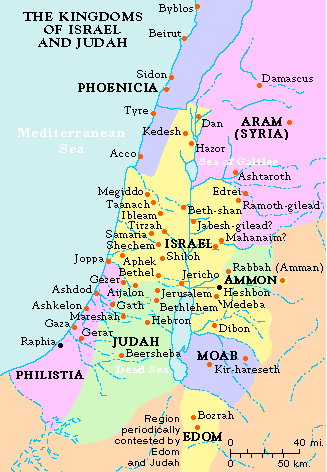
At the time of Jephtah, the territories that later became Israel and Judah were controlled by the Canaanites, who naturally resisted the intrusion of the Hebrew tribes.
Israelites v. Canaanites
The land they entered was already occupied by Canaanites, who held the area now covered by Israel and Lebanon.
The Canaanites governed the land, particularly the fertile plains, through a sophisticated system of city-states. The Israelite tribes could only gain a foothold in the sparsely populated, less fertile hill territories of Canaan.
Archaeological research shows that their occupation of Canaan happened not by sudden conquest, as the Bible describes, but by gradual infiltration.
The Canaanites naturally resisted this intrusion, as the stories of Jephtah and his unnamed daughter show only too well. They were more technologically advanced than the Israelites, who for a long time had only a precarious hold on the territory.
But over a period of time the Israelites gained control of the extreme north and south of the country.
Jerusalem and the fertile plain of Esdraelon still remained under the control of the Canaanites, and the Philistines controlled the coastal area.
For additional information on the lives of women in the Bible, see the links to
Family, work and religion: the tribe, the family, slaves, women’s tasks, beliefs
Milestones in a woman’s life: Puberty, menstruation, marriage, childbirth, death, burials

Jephtah’s daughter links
Bible study activities
has a list of movies about tragic heroes like Jephtah, men who move towards inevitable doom
© Copyright 2006
Elizabeth Fletcher


